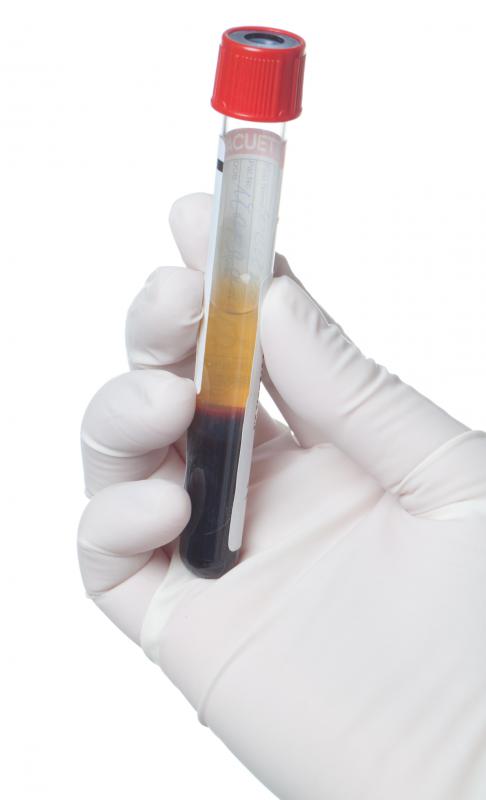At TheHealthBoard, we're committed to delivering accurate, trustworthy information. Our expert-authored content is rigorously fact-checked and sourced from credible authorities. Discover how we uphold the highest standards in providing you with reliable knowledge.
What is a Renal Profile?
A renal profile is a diagnostic test that is designed to collect information about kidney function. It may be ordered if a doctor suspects that a patient has kidney problems or as part of an overall health screening to identify any medical problems a patient may be experiencing. The test requires a blood sample for analysis and may be performed as part of a full blood panel to determine the cause of a medical issue.
In a renal profile, a technician checks for levels of creatinine, calcium, sodium, chloride, carbon dioxide, albumin, blood urea nitrogen (BUN), protein, phosphorus, glucose, and potassium in the blood. The technician uses reference ranges established for patients of the same age and gender to determine whether or not levels are abnormal. Based on this information, the technician generates a report with a listing of the levels and notes on any unusual findings in the renal profile.

When someone goes to the doctor with problems relating to urination, such as excessive thirst and urination, painful urination, straining, and so forth, a urinalysis is usually ordered first to determine if the explanation for the problem is in the bladder. If the urinalysis results are abnormal, a renal profile may be requested to collect more information and see if the problem lies in the kidneys. Renal profiles can also be used as diagnostic tools for people with conditions like gout.

In people with chronic kidney problems, including kidney disease and kidney failure, renal profiles are used for monitoring. If there are sudden changes in the renal profile, it suggests that the patient may be developing a medical problem that requires treatment. In addition, renal profiles are used to monitor kidney health after a transplant or living donation to ensure a patient is doing well and to identify any complications before they develop into major problems.

Usually test results come back quickly, especially if the sample was taken in a facility that has its own lab. The doctor will call with the results and discuss further options with the patient. This may be as simple as a phone call to let a transplant patient know that she or he is doing well, or it may involve discussing additional diagnostic testing to learn more about a problem happening inside a patient's kidneys. Additional testing options can include medical imaging studies to visualize the kidneys, as well as biopsies to determine whether or not cell changes are occurring in the kidneys.
AS FEATURED ON:
AS FEATURED ON:
















Discussion Comments
@Hawthorne- I have pain and straining while urinating. Last time I was at my doctor, he did a renal profile blood test to figure out what is going on. He said that a renal profile is really the only test they have that lets them see levels of substances in the blood. After the doctor got my results back, he said I have a high BUN count.
Can anybody tell me how accurate a renal profile is? My father in law has been having some trouble urinating, and his doctor wanted to run a renal profile on him.
He's going in next week, and we're really just trying to find out as much information as we can before the test. Has anyone reading this had this done, or have any more information about it?
Post your comments